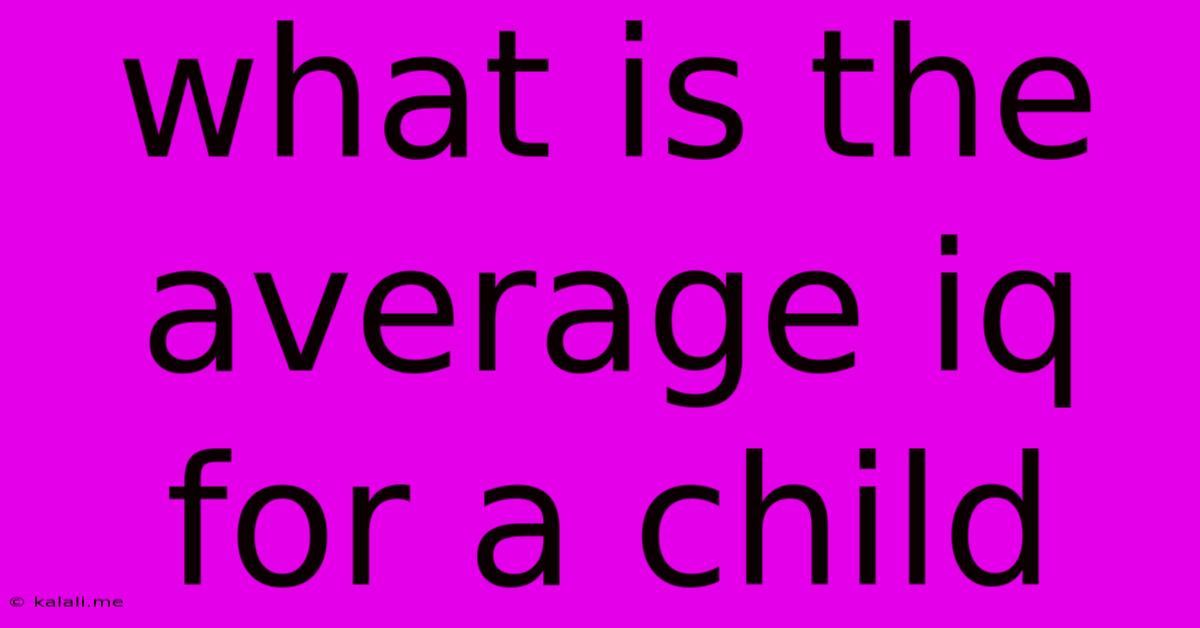What Is The Average Iq For A Child
Kalali
Jun 12, 2025 · 3 min read

Table of Contents
What's the Average IQ for a Child? Understanding Intelligence Quotients
Understanding your child's intellectual development is a natural concern for many parents. One common metric used to assess this is the Intelligence Quotient, or IQ. This article delves into what IQ scores represent, what the average IQ for a child is, and the important caveats to consider when interpreting these scores. It's crucial to remember that IQ is just one piece of the puzzle when assessing a child's overall abilities and potential.
What is IQ?
IQ tests are designed to measure a range of cognitive abilities, including problem-solving skills, memory, spatial reasoning, and verbal comprehension. These tests typically involve a series of tasks and questions, and the results are compared to the performance of other children of the same age group. The scores are standardized, meaning they follow a normal distribution curve.
The Average IQ Score:
The average IQ score is set at 100. This means that a score of 100 indicates that the child's performance is in line with the average performance of children their age. The standard deviation is typically 15, meaning that approximately 68% of children will score between 85 and 115.
IQ Score Ranges and Interpretations:
While the average IQ is 100, understanding the broader range is crucial:
- Below 70: Generally considered to be in the intellectually disabled range. This requires further evaluation and support.
- 70-85: Below average.
- 85-115: Average range.
- 115-130: Above average.
- Above 130: Often considered gifted or highly gifted.
It's important to remember these are broad ranges, and individual differences within these categories are substantial.
Factors Influencing IQ Scores:
Several factors can influence a child's IQ score, including:
- Genetics: Heredity plays a significant role in intelligence.
- Environment: A stimulating and enriching environment fosters cognitive development. Access to quality education, nutrition, and healthcare are all crucial.
- Socioeconomic Status: Children from higher socioeconomic backgrounds often have better access to resources that support cognitive development.
- Health and Well-being: Physical and mental health significantly impacts cognitive function.
Limitations of IQ Tests:
While IQ tests can be useful tools, it's crucial to acknowledge their limitations:
- Cultural Bias: Some tests may contain cultural biases that disadvantage children from certain backgrounds.
- Narrow Focus: IQ tests primarily measure certain cognitive abilities and may not capture the full spectrum of a child's intelligence, such as creativity, emotional intelligence, or practical skills. This is why a holistic approach to child development is essential.
- Test Anxiety: A child's performance can be influenced by anxiety or stress during the testing process.
Beyond the Numbers: A Holistic Approach to Child Development
Focusing solely on a child's IQ score can be misleading. A holistic approach considers various aspects of development, including emotional intelligence, social skills, creativity, and physical abilities. Parents and educators should prioritize fostering a supportive and stimulating environment that encourages a child's overall growth and development. Observing a child's strengths and weaknesses, providing opportunities for learning and growth, and celebrating their unique talents are far more important than fixating on a single number. If you have concerns about your child's development, consulting with a pediatrician, educational psychologist, or other relevant professionals is recommended. They can provide a more comprehensive assessment and guidance.
Latest Posts
Latest Posts
-
Which Of The Following Statements Are True Regarding Rfid
Jun 13, 2025
-
Least Common Multiple Of 6 5 And 7
Jun 13, 2025
-
Which Of The Following Produce Antibodies
Jun 13, 2025
-
Which Of The Following Is A Qualitative Research Method
Jun 13, 2025
-
How To Spell 20 In Word Form
Jun 13, 2025
Related Post
Thank you for visiting our website which covers about What Is The Average Iq For A Child . We hope the information provided has been useful to you. Feel free to contact us if you have any questions or need further assistance. See you next time and don't miss to bookmark.